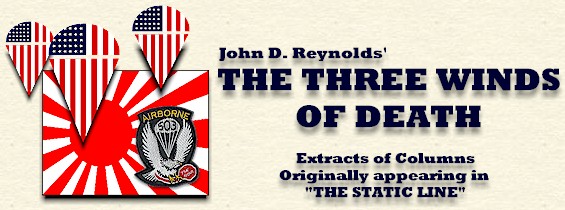|

Column,
August 91
Way
back when I began to write this column I was desperately searching for
material about which to write (and I still am) I had heard a rumor (you know
all about rumors) that the 503rd drop on Corregidor was one of the so-called
"classic" military maneuvers discussed in the curriculum at the
Military Academy at West Point. Supposedly the Corregidor jump was a prime
example of the military art of "vertical envelopment." For some
strange reason my faith in rumors has been completely shattered, and with a
desire to pass on to all of you only "the beautiful truth" I wrote
to the Military Academy at West Point for verification, or denial, of the
inclusion of this particular part of past history in the current curriculum.
I
received the following reply.
The
Department of History
Department of The Army,
United States Military Academy,
West Point, New York 10096-1793
Dear
Mr. Reynolds,
The
following is in response to your enquiry on our military history instruction
here at the Academy. As part of our two semester course in military history
(which is mandatory instruction for all cadets), we devote one lesson to
discussion of MacArthur’s Southern Pacific Drive. As part of this, we cover
briefly the airborne drop onto Corregidor. However we are currently in the
process of updating our military history instruction to include a four lesson
seminar on selected campaigns of the Second World War. One of our instructors
is offering as his seminar the campaign for the Philippine Islands which may
include segments on the 503rd’s actions. As soon as his syllabus is
submitted, I will be back in contact
with you. Thankyou for your interest in military history instruction at the
Academy. If we can be of further instruction, please contact me.
Sincerely,
James H. Embrey,
Captain, IN,
Assistant Professor,
Department of History.
It
was interesting to learn and in my mind a little disappointing that
MacArthur's Southern Pacific Drive was covered in just one lesson, but I guess
that just fails in line with the decision back in WWII to allow 10 percent of
the war effort to fighting the Japanese. Anyhow. I am appreciative of the fact
that my inquiry received an answer. Just thought you all would like to know.
And, of course, I will pass on to you any information I receive in the future
concerning the military history curriculum conducted at the Military Academy
at West Point.
Many
of you were not in attendance at the 50th reunion in Washington to hear
Charlie Rambo tell his Australian joke. So
l am going to pass it onto you since many of you have been to Australia. It
seems that an American tourist went to Australia for a vacation and was
involved in a terrible automobile accident. The Yank regained consciousness in
an Australian hospital. As he gradually became aware of his surroundings he
saw that most of his entire body was wrapped in bandages, hoses were coming
out of and going Into him at many different places. He was being given blood,
he was the recipient of glucose. HE WAS A MESS.
His eyes were finally able to focus on a person bending over him. She
was an Australian nurse, and the American asked the nurse, "Did you bring
me here to die?" and the Australian nurse answered, "No. We brought
you here yesterdie."
Some
things creep their way into columns of this nature that you don't really plan
and sometimes you intend to put things in that get left out. Like, for
instance, several months ago I had intended to include a little piece of
trivia and somehow it just got lost in the shuttle. Way back in February while
attending the Deep South Corregidor mini-reunion, I had a chance to get back
to the Infantry Museum in Fort Benning. Museums, of course, are places you can
walk swiftly through and say that you have been there. Or they are places that
you can lose the entire day in exploring.
Anyhow,
on this particular visit I found a display of the recipients of the Triple
CIB. That is, those people who
have been awarded the Combat Infantry Badge from three different wars. Do you
have any idea how many people have been so honored? I counted 72 names
engraved in recognition. One name was that of Larry Okendo, a member of the
503rd PRCT WWII Association. If there were others from the 503rd I did not
recognize their names. All of those listed served in WW II, the Korean War and
the Vietnam War. The Triple CIB display is not in a very prominent place. I
missed it the other time I was in the Infantry Museum. It maybe should be
placed where it couldn't be missed.
The
search is on for the youngest person who served in the 503rd PRCT and to show
you we don't believe in age discrimination
also the oldest. It you think that may be you,
write me ~ Write me about something, anyhow.
READ ON.../2
|

